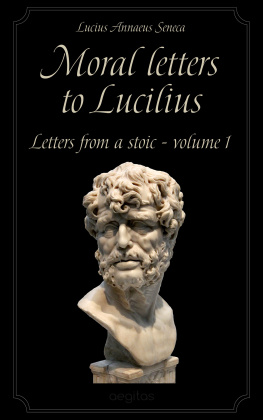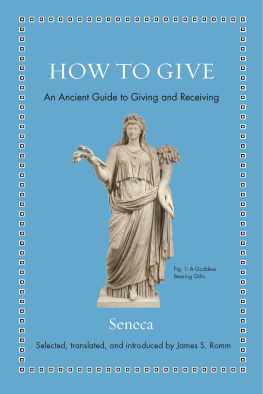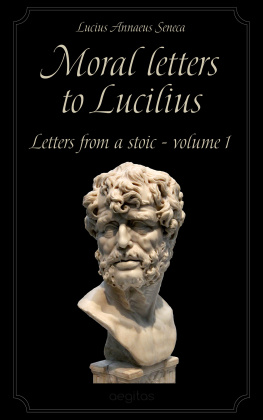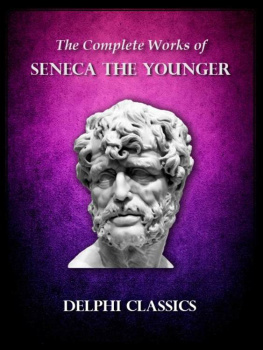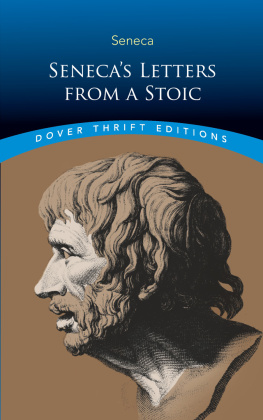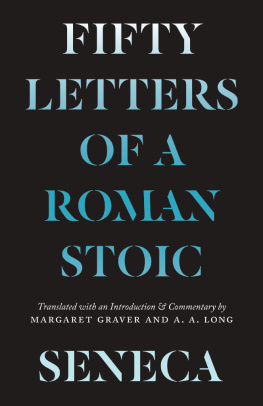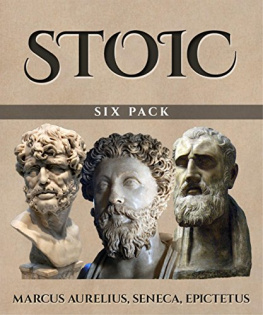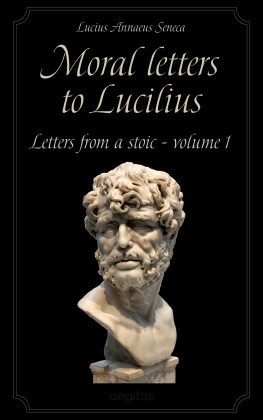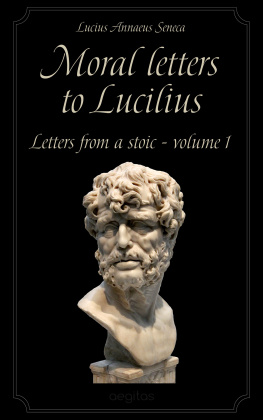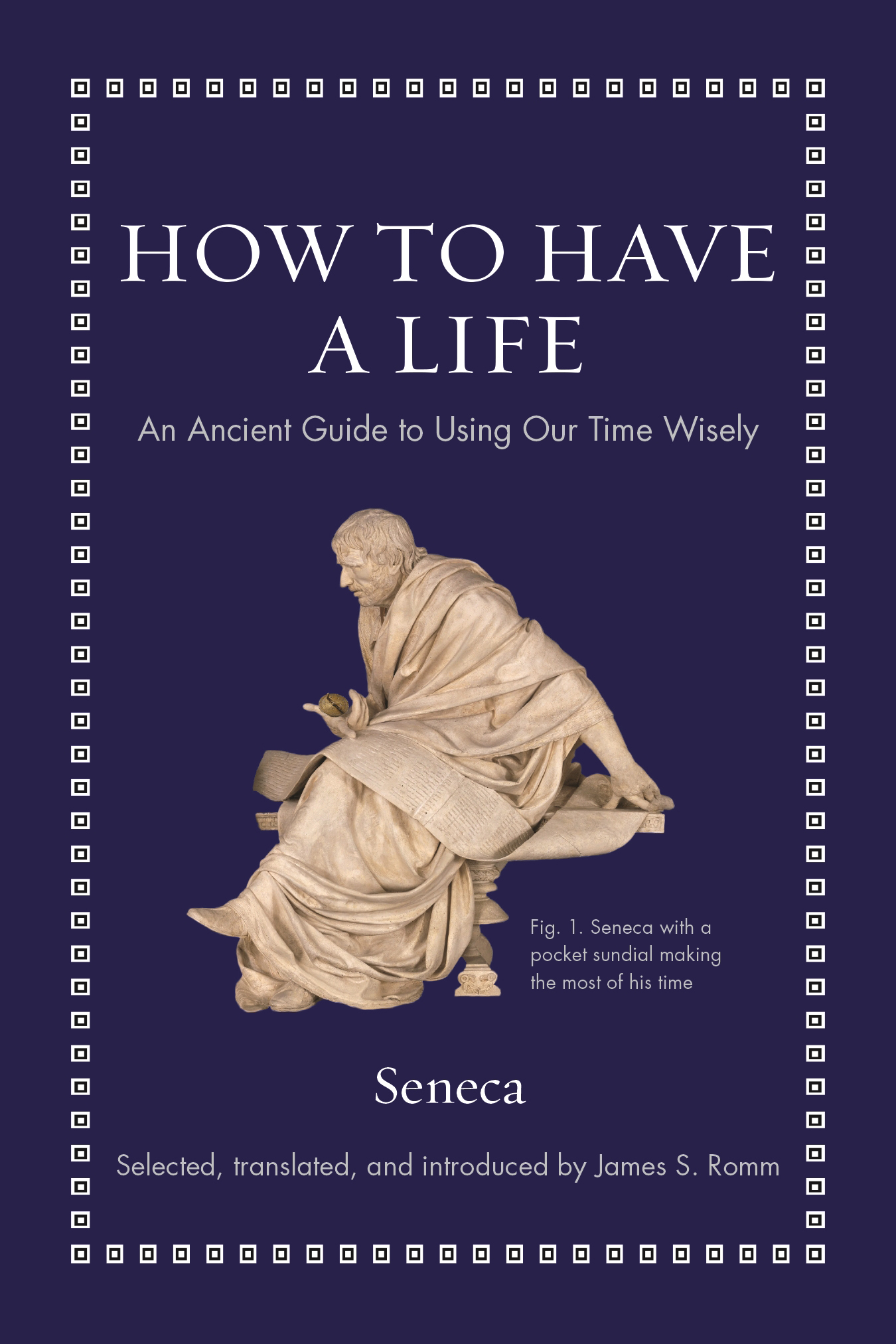HOW TO HAVE A LIFE
ANCIENT WISDOM FOR MODERN READERS

For a full list of titles in the series, go to https://press.princeton.edu/series/ancient-wisdom-for-modern-readers.
How to Tell a Story: An Ancient Guide for Aspiring Writers by Aristotle
How to Stop a Conspiracy: An Ancient Guide for Saving a Republic by Sallust
How to Be a Farmer: An Ancient Guide to Life on the Land by Many Hands
How to Innovate: An Ancient Guide to Creative Thinking by Aristotle
How to Tell a Joke: An Ancient Guide to the Art of Humor by Marcus Tullius Cicero
How to Keep an Open Mind: An Ancient Guide to Thinking Like a Skeptic by Sextus Empiricus
How to Be Content: An Ancient Poets Guide for an Age of Excess by Horace
How to Give: An Ancient Guide to Giving and Receiving by Seneca
How to Drink: A Classical Guide to the Art of Imbibing by Vincent Obsopoeus
How to Be a Bad Emperor: An Ancient Guide to Truly Terrible Leaders by Suetonius
How to Be a Leader: An Ancient Guide to Wise Leadership by Plutarch
How to Think about God: An Ancient Guide for Believers and Nonbelievers by Marcus Tullius Cicero
HOW TO HAVE A LIFE

An Ancient Guide to Using Our Time Wisely
Seneca
Selected, translated, and introduced
by James S. Romm
PRINCETON UNIVERSITY PRESS
PRINCETON AND OXFORD
Copyright 2022 by Princeton University Press
Princeton University Press is committed to the protection of copyright and the intellectual property our authors entrust to us. Copyright promotes the progress and integrity of knowledge. Thank you for supporting free speech and the global exchange of ideas by purchasing an authorized edition of this book. If you wish to reproduce or distribute any part of it in any form, please obtain permission.
Requests for permission to reproduce material from this work should be sent to
Published by Princeton University Press
41 William Street, Princeton, New Jersey 08540
99 Banbury Road, Oxford OX2 6JX
press.princeton.edu
All Rights Reserved
ISBN 9780691219127
ISBN (e-book) 9780691219462
Version 1.0
British Library Cataloging-in-Publication Data is available
Editorial: Rob Tempio and Chloe Coy
Production Editorial: Mark Bellis
Text Design: Pamela Schnitter
Jacket Design: Heather Hansen
Production: Erin Suydam
Publicity: Maria Whelan and Carmen Jimenez
Jacket Credit: Nero and Seneca Photographic Archive Museo Nacional del Prado. Sundial, Inv. 51358 History of Science Museum, University of Oxford.
CONTENTS
- vii
INTRODUCTION
No one on his deathbed ever said, I wish Id spent more time on my business. That oft-quoted sentence has been around for about forty years. It was first used by a friend of Massachusetts senator Paul Tsongas, after the senator learned he had cancer. The thought helped convince Tsongas not to run for reelection, as he had planned; he withdrew from politics briefly but returned after successful medical treatment and ran for the Democratic presidential nomination in 1992.
Lifes too short, we often say, in a briefer version of the Tsongas sentenceby which we mean, I refuse to spend my time, since that will one day come to an end, on this tedious task. We also speak of bucket lists, things we hope to do before death arrives, or conduct a thought experiment: If you had only one day to live In various ways we try to grasp that time is a finite resource. We also berate ourselves for wasting time and thus deride the internet as a time suck or allow our smartphones to remind us of how much time weve spent in the labyrinths they provide (an average of 3.5 hours a day for adults, according to a 2019 study).
Seneca the Younger, who like Paul Tsongas served in the Senate and triedunsuccessfullyto withdraw from politics, would have approved of the notion that life must be viewed from an imagined deathbed. Indeed, in the essay translated in this book, De Brevitate Vitae, or On the Shortness of Life, Seneca constantly adopts that perspective. He imagines himself speaking to centenarians, on the brink of the grave, and asking them to total up the days spent on pedestrian tasks, on meeting the needs of others, or on idle, transitory pleasures. When you look at whats left, he advises those in extreme old age, youll see that youre actually dying young.
If Senecas message were merely lifes too short, his essay might be worth reading, but in fact it goes much farther. Time, it turns out, is not the limited resource we think it is. Like money, to which Seneca often compares it, time can be stretched by putting it to good use. We speak of quality time, but time well used actually has greater quantity. A life that extends twenty calendar years might thus be longer than one that attains triple digits. In his most fervent passages, Seneca even proposes that the best use of time might grant us a kind of immortality. He offers mere hints, at first, at what that best use consists of, then fully explicates it as his essay reaches its climax (I wont spoil the impact of the big reveal by anticipating it here).
Along the way to this climax, Seneca lampoons various forms of time wastage, hitting especially hard at business pursuits and gain-seeking. He comes back again and again to the system the Romans called clientela, in which poorer clients, or dependents, went to the homes of wealthy patrons, usually in the early morning, to pay their respects and seek favors or advice. Both patrons and clients, in Senecas view, are demeaned by this system and made to expend huge amounts of their precious time. Yet Seneca, as we know, took part in the system himselfa problem we shall return to below.
Little better than those who squander time on business are those so engrossed in a hobby or avocation that they, too, surrender their time to feed their obsession. Under this heading, Seneca castigates those who give lavish dinner parties, who meticulously groom their hair, or who conduct research into obscure historical questions (this last attack sends a chill down the classicists spine!). All such people are lumped together by Seneca, along with those driven by business and legal pursuits, under the Latin term occupati, rendered here (inadequately) as preoccupied. One by one, Seneca turns his withering glance on each of these occupati, such that his treatise becomes, for long stretches, an entertaining piece of social satire.
Wealth and luxury are frequently lurking behind the pursuits of the occupati, so Senecas attacks on wastage of time are also, indirectly, hits at Roman materialism. His ultimate target is the pampered aristocrat who gets carried around from bath to sedan chair by teams of household slaves. This grotesque fellow is so unaware of his surroundings that he cant even tell his own posture; Am I seated now? he asks his porters, after they place him in his chair. How can he be the master of any portion of time? asks Seneca, bringing his diatribe back to its main theme. Great wealth takes us out of ourselves and away from whats real and true; it prevents us from being masters of time, an intriguing phrase found only here.
Though Seneca writes dismissively about wealth and about the preoccupations of Romes elite, it must be noted that he belonged to that elite and was enormously wealthy. Moreover, in the terms of the Roman clientela system, Seneca was an immensely powerful and sought-after patron. At the time On the Shortness of Life was written, he was in fact serving as chief minister to young Nero, the ruler of Rome, a post in which Seneca was besieged by clients daily. This paradox raises the problems, faced often by readers of Seneca, of how the mans life measured up to his own ideals and of how to interpret advice that he seems, at first glance anyway, to have himself ignored.




